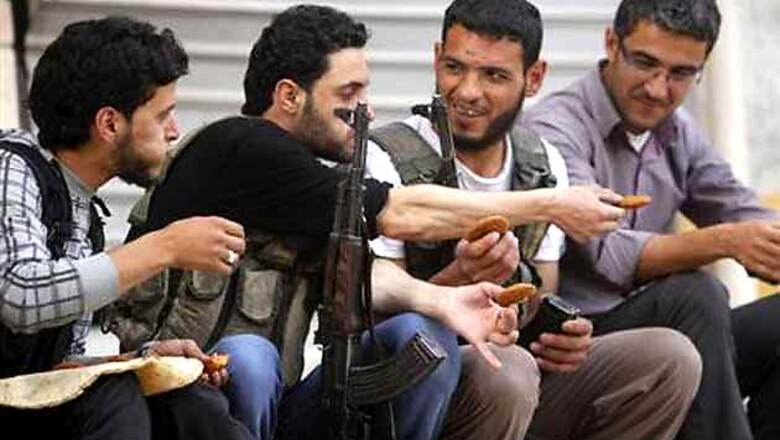
views
Washington: The United States could decide as early as this week whether to arm Syrian rebels, US officials said on Monday, as Secretary of State John Kerry put off a Middle East trip to attend meetings on the subject.
The battlefield has tilted against the rebels in the Syrian civil war as Lebanese Hezbollah has entered the fray on the side of Syrian President Bashar al-Assad, helping his forces retake the strategic town of Qusair last week.
However, the White House has debated for months whether to give arms to the rebels and a US official stressed that while a decision was possible as early as this week, deliberations on the issue could easily take longer.
US officials are adamant that Washington will not put "boots on the ground," which means deploying troops.
Fredrick Hof, a former senior US official who worked on Syria policy, said the administration might decide to take charge of the distribution of weapons to the rebels, but not necessarily to provide US arms.
Having withdrawn US troops from Iraq and working to wind down the war against the Taliban in Afghanistan, President Barack Obama has sought to avoid deeper involvement in the Syrian civil war.
The shift in the military momentum toward Assad has made it less likely that a US and Russian planned peace conference to bring the rebels and the government to the table for talks would yield a negotiated political transition to remove Assad from power.
With Assad's forces, backed by Hezbollah and Iran, gaining the upper hand, he has little incentive to give up power.
The renewed focus on Syria comes two years into the uprising against Assad that has seen at least 80,000 people killed and has sent hundreds of thousands of refugees into Turkey and Jordan and displaced millions within Syria.
Kerry delayed plans to travel to Israel and the Palestinian Territories this week to attend what the State Department called "routine" meetings, including on the topic of Syria.
The United States and other governments are also weighing evidence that Assad's forces may have used chemical weapons, something Obama has said would cross a "red line."
This week's Syria meetings are not a sign that the Obama administration has received conclusive proof of chemical weapons use by Assad's forces or that it is ready to decide on a response, one US official said.
Obama has set no timetable for a chemical weapons assessment from the US intelligence community and the investigation is continuing, the official said.
A consensus on whether or not to arm the rebels remains elusive, with US policymakers still wrestling with concerns that any American weapons could fall into the wrong hands.
Also, growing controversy at home over the government's sweeping surveillance programs are expected to occupy much of Obama and his national security team's time.
A Western diplomatic source said the decision to arm the rebels was fraught with risks and could backfire.
"If you arm the rebels, there is a risk they fall into the wrong hands, but if you don't then thousands more could get massacred and you're left with Hezbollah versus Nusrah. Which is the worst risk? That's the political decision the leaders will need to decide," the diplomatic source said.
Hof, now an analyst at the Atlantic Council, said the White House might decide to take charge of the distribution of weapons to the rebels but not necessarily to provide US arms.
"If the president is going to make that decision this week ... I suspect it would be a decision for the United States to take charge of the process by which carefully vetted units of the Free Syrian Army get what they need, both in terms of lethal and in terms of non-lethal (aid)," Hof said.
He also suggested such aid could be funneled through General Salim Idriss of the Supreme Military Council, the military wing of the main civilian opposition group, helping the former Syrian military officer gain credibility with other fighters and perhaps greater control over the fractious anti-Assad fighters.
Obama this year shifted policy by giving US medical kits and military rations to the rebels. Arms, however, have been left to Arab nations such as Saudi Arabia and Qatar to provide.
"What's been needed here is American leadership and management of a process which, if left in the hands of local actors, simply results in the accumulation of clients and a very uneven supply system in terms of effectiveness," Hof said.
By centralizing the delivery of arms - whatever their origin - it might become easier to get the rebels to work under a single command authority rather than as multiple militias with allegiances to various external powers.
A possible move by the United States to arm the rebels was first reported by the Associated Press late on Sunday.
Jen Psaki, a State Department spokeswoman, said Washington was looking at what more it can do to help the opposition, including assisting it to keep ground it has seized and retake ground from the government.
"We are taking a closer look at what we can do to help the opposition," she said, without providing details.
Bernadette Meehan, a spokeswoman for the White House National Security Council, said the Obama administration was continually looking at ways to strengthen the opposition but had nothing new to announce.
"We have prepared a wide range of options for the president's consideration, and internal meetings to discuss the situation in Syria are routine," Meehan said.
"The United States will continue to look for ways to strengthen the capabilities of the Syrian opposition, though we have no new announcements at this time."


















Comments
0 comment